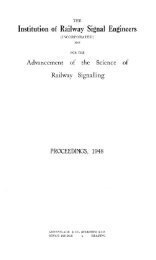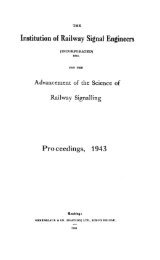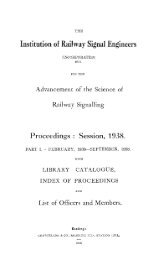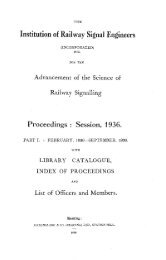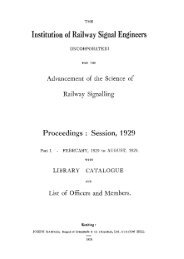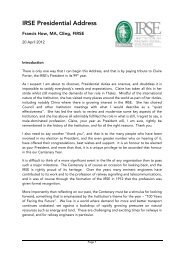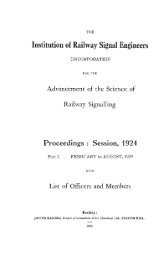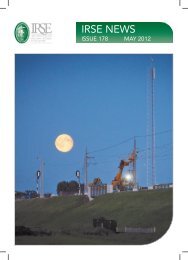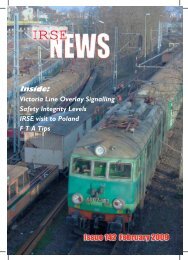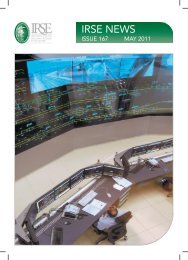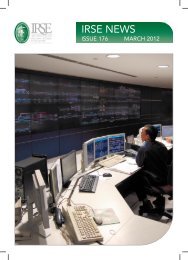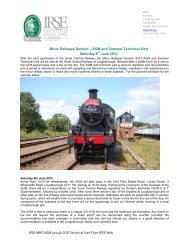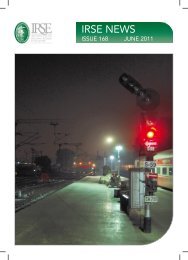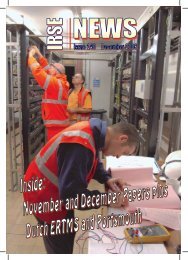IRSE Sept 08.indd
IRSE Sept 08.indd
IRSE Sept 08.indd
Create successful ePaper yourself
Turn your PDF publications into a flip-book with our unique Google optimized e-Paper software.
APPRENTICESHIP AWARD<br />
<strong>IRSE</strong><br />
So how do we measure success of the<br />
Network Rail Advanced Apprenticeship<br />
Scheme, is it by individual progression, or<br />
is it by the effect it will have in the long<br />
term development of Network Rail, and the<br />
UK rail industry? I think it is by both.<br />
Individual success will always be easier to<br />
measure, academic achievement,<br />
vocational achievement, promotion, and<br />
economic activity are all relative and fairly<br />
easy for individuals to measure against<br />
their peers both within the railway industry,<br />
and those outside. More difficult is the<br />
organisational benefit derived from the<br />
significant investment. Achieving<br />
Experienced Worker Standard [EWS] in a<br />
shorter timescale, achieving high levels of<br />
retention, encouraging mobility, and<br />
promoting transferable skills, these are<br />
some of the metrics that can be applied.<br />
But what about the effect on culture within<br />
Network Rail, how will that change over a<br />
period of time, and to what extent will the<br />
Advanced Apprenticeship Scheme have on<br />
that change? When will this be achieved,<br />
what is a significant cohort of apprentice<br />
trained technicians, supervisors and front<br />
line managers needed to inculcate this<br />
evolutionary change from the bottom up,<br />
supporting the other top down drivers for<br />
change. What effect will 200 have on the<br />
business? And what effect will 2000 have<br />
on the business? Maybe that should be<br />
another article in a few years time.<br />
Supporting the growth of the UK<br />
economy is also another lynch pin of all<br />
apprenticeship schemes and underpins<br />
the government’s current emphasis on<br />
developing a workforce with a higher level<br />
of skills. The UK skill base is falling behind<br />
other countries, not because we are<br />
standing still, but because other countries<br />
are progressing faster and further.<br />
Economic competitiveness is dependent<br />
upon significantly increasing the UK skills<br />
base, and this set against a significant<br />
decline in school leavers just around the<br />
corner. The Leich report identified the<br />
need to increase the quality and quantity<br />
of apprenticeships in the UK, and Network<br />
Rail has risen to that challenge.<br />
So after just three years of the<br />
Advanced Apprenticeship Scheme, how<br />
successful has it been? Marketing of the<br />
scheme has had an effect, from 950<br />
applications in 2005 to 3500 applications<br />
for the 2008 intake. This year, the first<br />
Telecommunications apprentices will also<br />
be taken on. Network Rail are attracting a<br />
more diverse workforce into the scheme<br />
with a higher percentage of ethnic<br />
minorities and females into engineering<br />
apprenticeships than the national average.<br />
The academic achievement of the<br />
apprentices has also steadily risen with<br />
75% of the 2007 intake achieving a<br />
distinction in mathematics at BTec Level 3<br />
[ONC in old speak]. Retention during the<br />
Taryn Bailey being presented<br />
by Colin Porter, Chief<br />
Executive <strong>IRSE</strong>, with the<br />
<strong>IRSE</strong>/NR S&T Apprentice of<br />
the Year Award trophy (left)<br />
and Award Certificate (above)<br />
at HMS Collingswood on<br />
13 June 2008<br />
(Network Rail)<br />
apprenticeship scheme has also steadily<br />
increased from 88% for the 2005 intake to<br />
99% for the 2007 intake. Individual<br />
performance has also been recognised.<br />
Taryn Baily who was this years <strong>IRSE</strong>/<br />
Network Rail S&T Engineering Apprentice<br />
of the year, has just been appointed to a<br />
Senior Technician position at Preston.<br />
The 2008 intake commences in<br />
<strong>Sept</strong>ember, and the future of the scheme<br />
looks pretty well secure for the next few<br />
years. Have we done enough to meet the<br />
increased demand over the next decade,<br />
of course time will tell, but I think we have<br />
made significant strides over the last five<br />
years, and we will continue on that path.<br />
We have risen to the challenge.<br />
(Colin Porter Footnote)<br />
The <strong>IRSE</strong> Council initiated the <strong>IRSE</strong>/NR<br />
S&T Apprentice of the Year Award earlier<br />
this year to recognise the significant efforts<br />
being put into recruitment and training by<br />
Network Rail.<br />
The award consists of the colour light<br />
signal Trophy which is retained at<br />
HMS Sultan, a Certificate, a cheque for<br />
£100 and a year’s free membership of the<br />
<strong>IRSE</strong>.<br />
The Trophy was kindly donated by<br />
Unipart Rail, having been manufactured at<br />
the York Service Centre.<br />
<strong>IRSE</strong>/NR S&T Apprentice of the Year Award trophy<br />
(Colin Porter)<br />
24<br />
Issue 137 <strong>Sept</strong>ember 2008<br />
<strong>IRSE</strong><br />
NEWS



